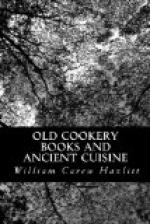But it is needless to say that Neckam merely dealt with a theme, which had been familiar many centuries before his time, and compiled his treatise, “De Utensilibus,” as Bishop Alfric had his earlier “Colloquy,” with an educational, not a culinary, object, and with a view to facilitate the knowledge of Latin among his scholars. It is rather interesting to know that he was a native of St. Albans, where he was born in 1157. He died in 1217, so that the composition of this work of his (one of many) may be referred to the close of the twelfth century. Its value is, in a certain sense, impaired by the almost complete absence of English terms; Latin and (so called) Norman-French being the languages almost exclusively employed in it. But we have good reason indeed to be grateful for such a legacy in any shape, and when we consider the tendency of ways of life to pass unchanged from one generation to another, and when we think how many archaic and (to our apprehension) almost barbarous fashions and forms in domestic management lingered within living recollection, it will not be hazarding much after all to presume that the particulars so casually supplied to us by Neckam have an application alike before and after.
A student should also bear in mind that, from the strong Anglo-Gallic complexion of our society and manners in early days, the accounts collected by Lacroix are largely applicable to this country, and the same facilities for administering to the comfort and luxuries of the table, which he furnishes as illustrative of the gradual outgrowth from the wood fire and the pot-au-feu among his own countrymen, or certain classes of them, may be received as something like counterparts of what we possessed in England at or about the same period. We keep the phrase pot luck; but, for most of those who use it, it has parted with all its meaning. This said production of Neckam of St. Albans purports to be a guide to young housekeepers. It instructs them what they will require, if they desire to see their establishment well-ordered; but we soon perceive that the author has in view the arrangements indispensable for a family of high rank and pretensions; and it may be once for all observed that this kind of literature seldom proves of much service to us in an investigation of the state of the poor, until we come to the fifteenth or even sixteenth century, when the artists of Germany and the Low Countries began to delineate those scenes in industrial and servile life, which time and change have rendered so valuable.
Where their superiors in rank regarded them as little more than mechanical instruments for carrying on the business of life, the poor have left behind them few records of their mode of sustenance and of the food which enabled them to follow their daily toil. The anecdotes, whatever they may be worth, of Alfred and the burnt cakes, and of Tom Thumb’s mamma and her Christmas pudding, made in a bowl, of which the principal material was pork, stand almost alone;




